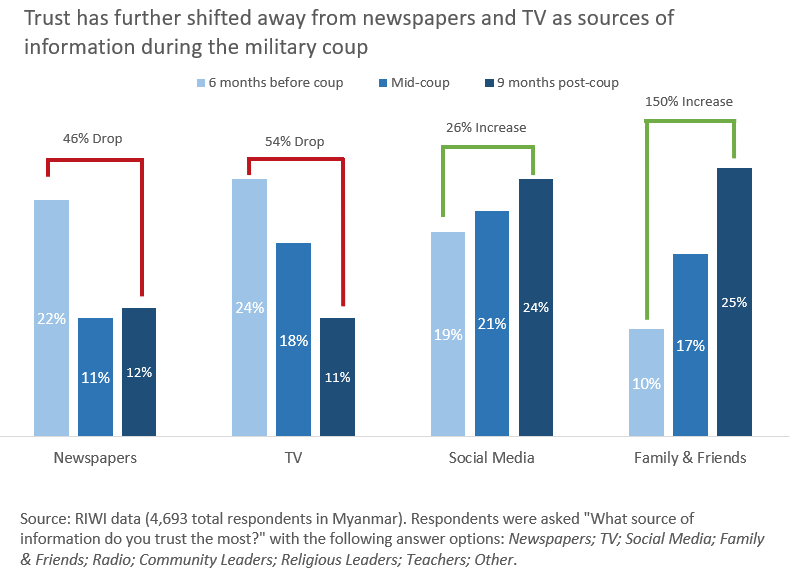By: Catherine Barker, Mercedes Fogarassy, Shaelyn Laurie
Data are current as of November 1, 2021, 23:00 Myanmar Standard Time (GMT +6:30)
Nine months after the military coup in Myanmar, we redeployed our technology to ask people there again who their most trusted information source is. We are seeing that the trends we saw immediately following the coup have further exacerbated nine months in. Public trust has increased further in social media and in one’s family and friends, while trust in traditional information sources like TV and newspapers further declined.
Since the coup on February 1st 2021, the junta have sought to restrict access to information. During the first months following the coup, the new regime sought to restrict communication between protestors and anyone outside of the country, including media, by attempting to shut down the Internet. While the international community struggled to gain reliable information, RIWI launched a rapid response effort to gain insight into citizen sentiment toward the military coup. Over the nine months following the coup, the violence has escalated to what is now being described as a “civil war”. As the international community decides how to approach the military leaders, and aid agencies pivot programming to support far more individuals than anticipated, it is imperative that accurate and transparent information about the rapidly changing context is accessible.
In Myanmar, good information is hard to come by. As Aung San Suu Kyi faces another closed trial, those living in Myanmar are further losing trust in traditional news sources which have been co-opted by military forces. This is exacerbated by the junta’s increased measures to surveil citizens, severely infringing upon civil liberties and freedom of expression. We believe that citizen sentiment and intelligence should be a central tenet of international and national decision making.
In light of this instability and uncertainty, we asked respondents in Myanmar who they trusted most for news and information. Prior to the coup, television was the most trusted source of information in Myanmar with almost 1 in 4 saying so, according to RIWI data collected over a three-week period in late 2020. This was closely followed by newspapers (22%). In March 2021, immediately following the coup, we saw that trust in these traditional news sources had fallen, and trust in social media and family and friends had increased. Nine months later, these trends have only increased, and at a dramatic rate. The percentage of people who trust family and friends for information the most has increased by 150% since we first measured, making that source the most trusted source of information, and indicating a complete failure of open and public transmission of information.

In March of this year, the authors warned that the trends observed indicated that “Myanmar’s people will be at greater risk of falling behind the thickening veil of secrecy enacted by the military regime.” Nine months on, we can see that this is the case. During intrastate conflict, information is weaponized. It is understandable that people would rely on information from those who are within their social cohort. However, this can create a dangerous atmosphere in a nation that has only just begun its journey of repairing its violent ethnic fractures. It has been only five years since the Military enacted genocide against the Rohingya population. Myanmar is not a stranger to the disastrous impacts of the breakdown of trust between ethnic and racial groups, and as information sources become insular, so too does society at large.
Observing the trends in trust of sources gives an insight into where people are getting their information, and thus where they are experiencing the greatest social influences. The international community interested in promoting peace and human rights in the region should attend to these indicators, in real time, to understand how best to provide meaningful and impactful interventions. Myanmar’s people are in physical danger, but are also at risk of increased divisions among themselves, worsening the threat of violence against minorities in an already threatening environment.
RIWI’s unique capabilities ensure that the surveys, content, and campaigns deployed on our platform cannot be censored, blocked, or tracked. This enables us to rapidly and safely engage citizens in complex contexts on topics of vital importance. RIWI seeks to uncover the truth by listening to those who otherwise would not be able to be heard. We are proud to share this information with partners working to expose the truth and deliver justice in Myanmar.
Contact us at ask@riwi.com to discuss the information available and our capabilities in Myanmar or other fragile environments.
Image Credits: Gayatri Malhotra licensed under: Unsplash
